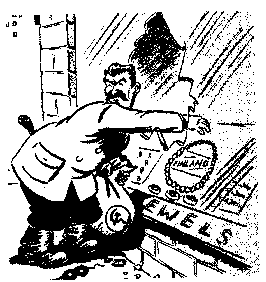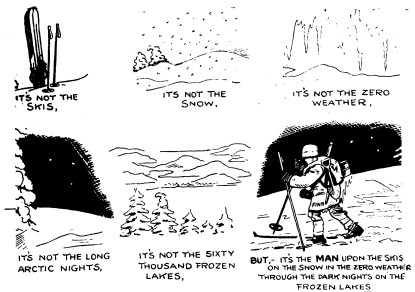"Russian Speaking Forces have Wanted Karelia and Finland for Seven Hundred Years. WWII: Defence of Leningrad: The Greatest Opportunity in History for Imperial Soviet Expansionism"
Between 1939 and 1944, Finland was a friend of the Leningrad people.
This page takes an alternative position regarding the validity of Stalin's reason for requiring Karelia and the Baltic states for the security of Leningrad. "Sorry Finnsky, but we want your land." Besides the fact that Khrushchev (and in this case he was actually telling the truth!) had already confirmed that Stalin wanted all of Finland, we know the following:
The reason for Russia's attack on Finland was like Swiss cheese.
"The only great power which could have earlier been a
potential threat to Leningrad - well, in that case presumably along the southern
coast of the Gulf of Finland - namely Germany, has concluded a non-aggression
pact with the Soviet Union, which means that there exists no threat against the
Soviet Union and Leningrad from there - without considering the overall present
importance of Leningrad to the Soviet Union. And the new Soviet naval and air
bases in Liepaja (Libau), Ventpils (Windau), Hiiumaa, Saaremaa and Paldiski
permit, as disclosed by the Soviets, the Soviet Union to rule the Baltic Sea and
thus the Gulf of Finland and up to the Gulf's farthest recess in front of
Leningrad.
A request for negotiations with the Soviet government was
received on the 5th of October. For over a month friendly discussions were
carried out between the Finnish and Soviet Cabinets concerning concrete
political issues of certain territorial exchanges to "improve the security of
Leningrad."
Judging from the present facts, all arguments about threats to Leningrad from the Finnish territory are very difficult to understand." Prime Minister A.K. Cajander on the 23rd of November 1939, at Helsinki Fair Hall

Points to consider:
- 1) The boarder is too close to Leningrad: defensive requirements.
- 2) Viipuri (Vyborg) is an old Russian city occupied by the Finns.
- 3) They are attacking Finland in order to help the Finnish people.
- 4) Finland is really a part of Russia.
- 5) Finland is a Fascist country.
- 6) Karelia is a Russian province.
- 7) More access to the Baltic.
- Suomi Beauty - in 1939 Stalin told the Finns that he was coming to "Liberate" them from the lying capitalists - in this song.
- 2) Viipuri (Vyborg) is an old Russian city occupied by the Finns.

The Result of Churchill and Roosevelt's policies:
The whole thing was all a big mistake, a misunderstanding, that Stalin played to the hilt! The naive Roosevelt thought Stalin stood for some undefined type of democracy, a new world order and peace forever! The American people were unfortunately mislead to believing in Stalin by listening to gullible (From gull, the seabird considered to be stupid; sorry guy.) Roosevelt. The claims that the world had been made safe for democracy was a half-truth. They had "won." But they had only made the world safe from Hitler and fascism, but not communism which was equally dangerous to freedom as the post war world demonstrated. Roosevelt had given a new deal to Eastern Europe and Finland.
17) Since England was at war with Finland, Churchill should have told Stalin in 1944 to back off and restore the 1939 borders instead of allowing Stalin to annex Karelia, since there was no longer a threat to Leningrad. Churchill asked Stalin if he would consider an American brokered separate peace with Finland, which was ofcourse turned down by the dictator. American and British radio propaganda campaigns tried to drum into the Finns that they were "not, after all, fighting for but against democracy." in solidarity with Stalin. (Consistant with the fact that Roosevelt thought Stalin stood for "a type of democracy," and explaining this baffling assistance to the bolsheviks in annexing neighbouring states and provinces - resulting in the biggest disaster to democracy and freedom of the 20th Century.) It also resulted in a hatred of Russia by Russia's neighbours that surpasses any seen in this the 20th century. That Russia is now being helped by the west to rearm is seen by those who were under their yoke as a continuation of the aid that helped Russia enslave them.
The policies of Churchill and Roosevelt failed to make the world safe for democracy, and correct the injustices of aggression in Europe because they strengthened Stalin's position so greatly with the Lend-Lease plan. Because of this strength, he was in a good position when he showed his true colors, to exercise preemptive maneuvers for control in Eastern Europe and Karelia. Churchill and Roosevelt had played into Stalin's hands; it was "checkmate." It is regretful that history has to cast such a shadow on these great statesmen, but that was their own doing - and they must accept responsibility. The world owes the American, Canadian and British people alot, this is true. But to whom do the Karelians, Baltic States and Eastern Europe owe their fates?
In 1939 Hitler and Stalin divided Europe between themselves, like it was some kind of loot. In 1945 Churchill, Roosevelt and Stalin carved up Europe in much the same cold-blooded way in the final chapter. Three men, determining the fates of millions, with no input from the people affected. Does this sound a bit too harsh? There are people, I assure you, who believe it is not harsh enough. Before the war, there was a Europe made up of free countries. And a Soviet Union made of unwilling vestiges of Czarist Russia. After the war there was a divided Europe, of which only the west half was free, and dozens of little countries, like Chechnya, Estonia, Latvia, Lithuania and so on, still trapped as colonial states in the Soviet Union. Eastern Europe went as war spoils to brutal Stalin and his "sphere of communist influence," while western Europe came under the control of gentle democracy. This was agreed upon and signed by the Big Three, not separate treaties. Sour grapes, and the feeling of having been tricked, came afterwards.
Therefore, the United States and Britain are morally bound to try make things better. Aid to Russia, which began during WWII, and terminated afterwards, has been resumed! Military spending by Russia has doubled in 1999 under President Clinton.
Churchill and Roosevelt realized finally that perhaps the Finns were right about Stalin. (T.S. Elliot's poem "The Hollow Men," describes men who became incapable of positive action. "We are the hollow men - we are the stuffed men..." Mr. Kurtz, he dead...a reference at the beginning of the poem to Joseph Conrad's Heart of Darkness - how the African jungle succumbs victims to its evil. Is this what happened to Roosevelt? Perhaps they should have spent more time listening to other points of view - not just Stalin's. They could have talked to a few Poles, Estonians, Finns, Hungarians and so on, before they decided on the future of Europe. Perhaps they didn't want to "offend" Stalin. Instead they listened to and were mouthpieces for the cunning murdering liar - Stalin. It is important that the world remembers Stalin for what he was, a beast, not the savior of anything. If there is any glory to come out of this, it is for the innocent Russian people who were slaughtered by Hitler and even more by Stalin's orders. Both the Holocaust and the Purges should be denounced and the war criminals exposed together. But pound for pound Stalin was worse because he killed more people.
The Hollow Men
Elliot, Thomas
Stearns (1888-1965)
MISTAH KURTZ -- HE DEAD.
A penny
for the Old Guy
I
We are the hollow men
We are the stuffed
men
Leaning together
Headpiece filled with straw. Alas!
Our dried
voices, when
We whisper together
Are quiet and meaningless
As wind in
dry grass
Or rats' feet over broken glass
In our dry cellar
Shape
without form, shade without colour,
Paralysed force, gesture without
motion;
Those who have crossed
With direct eyes, to death's other
Kingdom
Remember us--if at all--not as lost
Violent souls, but only
As
the hollow men
The stuffed men.
II
Eyes I dare not meet in
dreams
In death's dream kingdom
These do not appear:
There, the eyes
are
Sunlight on a broken column
There, is a tree swinging
And voices
are
In the wind's singing
More distant and more solemn
Than a fading
star.
Let me be no nearer
In death's dream kingdom
Let me also
wear
Such deliberate disguises
Rat's coat, crowskin, crossed staves
In
a field
Behaving as the wind behaves
No nearer--
Not that final
meeting
In the twilight kingdom
III
This is the dead
land
This is cactus land
Here the stone images
Are raised, here they
receive
The supplication of a dead man's hand
Under the twinkle of a
fading star.
Is it like this
In death's other kingdom
Waking
alone
At the hour when we are
Trembling with tenderness
Lips that would
kiss
Form prayers to broken stone.
IV
The eyes are not
here
There are no eyes here
In this valley of dying stars
In this
hollow valley
This broken jaw of our lost kingdoms
In this last of
meeting places
We grope together
and avoid speech
Gathered on this
beach of the tumid river
Sightless, unless
The eyes reappear
As the
perpetual star
Multifoliate rose
Of death's twilight kingdom
The hope
only
Of empty men.
V
Here we go round the prickly
pear
Prickly pear prickly pear
Here we go round the prickly pear
At
five o'clock in the morning.
Between the idea
And the
reality
Between the motion
And the act
Falls the shadow
For Thine is
the Kingdom
Between the conception
And the creation
Between the
emotion
And the response
Falls the Shadow
Life is very
long
Between the desire
And the spasm
Between the potency
and
the existence
Between the essence
And the descent
Falls the
Shadow
For Thine is the Kingdom
For thine is
Life is
For Thine
is the
This is the way the world ends
This is the way the world
ends
This is the way the world ends
Not with a bang but a whimper.